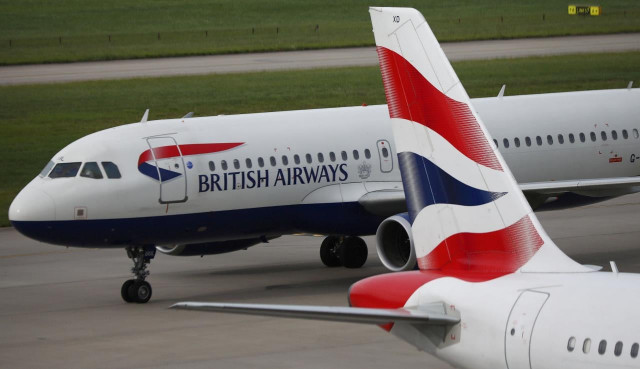As security situation improves, many UK firms eyeing Pakistan
Britain expresses interest in participating in CPEC

British Airways planes parked at Heathrow Terminal 5 in London, Britain. PHOTO: REUTERS
“We can’t ignore Pakistan…it is an essential destination,” British Deputy High Commissioner and Trade Director for Pakistan Elin Burns said while talking to media at the British Deputy High Commission in Karachi on Thursday.
“A host of things including (improvement in) security… and new Islamabad airport attracted British Airways back to Pakistan after the gap of a decade,” she said.
Many more UK-based firms are considering entering different sectors of Pakistan’s economy including banking and finance, infrastructure, energy, retail and services. Besides, many other companies are keen to boost bilateral trade with Pakistan as well, she said.
“Current (Pakistan Tehreek-e-Insaf - PTI) government is fully supportive,” Burns remarked.
British Airways would resume flights on June 2, 2019. “The new (PTI) government has played a significant role in attracting the airline back to Pakistan,” she expressed pleasure.
A number of UK business and trade delegations, backed by its government, have visited Pakistan since November 2017 when Pakistan was gearing up for general elections to be held on July 25, 2018. The delegations held meetings with federal and provincial ministers, traders and businessmen.
Currently, around 120 British firms are operating and investing in Pakistan.
Major UK businesses succeeding in Pakistan include Mott MacDonald infrastructure development, which played an integral role in the development of the new Islamabad airport; Unilever and Reckitt Benckiser in the consumer goods sector; Standard Chartered and UBL in banking; GlaxoSmithKline in pharmaceuticals and Shell in oil and gas as well as UK brands including Debenhams, Toni and Guy, Monsoon and Accessorize.
“Key sectors for UK businesses in Pakistan include professional services, energy and infrastructure, education, defence and security and retail and consumer goods,” she said.
The UK remained a leading foreign direct investor in Pakistan after China, she said. She, however, urged the government to improve the regulatory framework.
Earlier, a visiting UK Prime Ministerial Trade Envoy to Pakistan Rehman Chishti stated in September that Pakistan needed to improve legislation, regulations, transparency, taxation environment and address bureaucracy hurdles.
Trade to grow to £3.5b
Burns said the UK-Pakistan trade ties are also growing gradually every year and hoped that the trend would continue in the years to come. “The UK has remained the single largest export destination for Pakistan in the European Union bloc,” she said.
She recalled that there exists a massive untapped potential to boost bilateral trade, which remains heavily in favour of Pakistan. The bilateral trade stood at £2.9 billion in 2017. “It is expected to grow to £3.5 billion by 2020,” she said. “Pakistan has the potential to emerge as an increasingly strong trading partner of the UK,” she pointed out. “Trade is a critical part of modern international relations.”
GSP Plus
She said Pakistan would continue to export a number of products to the UK market at concessionary duties under the GSP Plus status despite Britain’s planned exit from the European Union by March 2019.
“The UK is committed to supporting Pakistan to trade its way out of poverty,” she emphasised. “As we leave the EU, we want to deepen our trade relationship with Pakistan.”
“The UK government is committed to maintaining the same levels of preferential access Pakistan receives in the UK markets under the EU GSP scheme,” she added. “It is important that Pakistan continues to progress on international obligations in order to retain its EU GSP Plus status, including protecting minority rights and steps to reduce the scale and scope of death penalty.”
CPEC
The British deputy high commissioner claimed that the ChinaPakistan Economic Corridor (CPEC) remains a huge opportunity and a growing area for Pakistan’s economy.
China is investing around $50 billion in Pakistan’s infrastructure including roads and railways and the power sector under its global Belt and Road Initiative (BRI).
She said the UK is also eager to play its unique role in CPEC projects as they offer a huge business opportunity for its businesses as well.
“We are keen to participate in CPEC.” “The UK has remained a long-term investor in Pakistan. It sees a stable, prosperous and democratic Pakistan by 2030,” she added.


















COMMENTS
Comments are moderated and generally will be posted if they are on-topic and not abusive.
For more information, please see our Comments FAQ